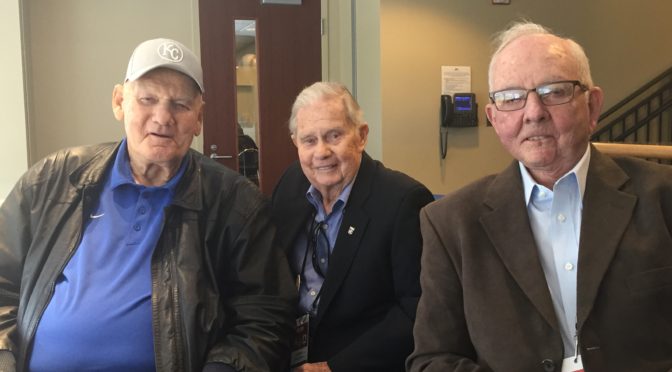Photo above courtesy of flickr: From left to right; Bill Fischer, Art Stewart and Donnie Williams
Audio above: Bill Fischer
By Greg Echlin
If a pitcher didn’t listen to Bill Fischer preaching the importance of throwing strikes, chances are that pitcher didn’t know him very well.
Fischer’s career off the field began actually the same season as his last season as a major league pitcher for the Minnesota Twins in 1964. It lasted all the way through 2018 as a senior pitching advisor for the Kansas City Royals. Fischer died on Oct. 30 at the age of 88.
“Baseball’s been very, very good to me. It’s the only job I really ever had, the only one I really got a paycheck from,” said Fischer in a 2013 Kauffman Stadium dugout interview.
Fischer’s playing career took a turn for the worst when he faced former Kansas City A’s teammate Gino Cimoli and absorbed a line drive and sprained his ankle while fielding the ball and throwing Cimoli out at first. Cimoli was one of only three batters Fischer faced the bottom of the ninth. That game on May 2, 1964, became better known for the Twins’ historic homer barrage when Tony Oliva, Bobby Allison and Jimmie Hall homered off Dan Pfister in the 11th. Then Harmon Killebrew added another homer in the 11th off Vern Handrahan.
Fischer made five more appearances that month on a bad ankle. “I tried to be a hero, and I couldn’t do it,” he said. For the rest of the season, Fischer traveled around the Twins minor system to check out their pitching prospects.
Only two years earlier, Fischer set a major league record that stands today when he pitched 84-and-a-third consecutive innings without issuing a walk, a record that stood since Hall of Famer Christy Mathewson did it over 68 innings in 1913. Fischer’s streak ended in the last game of the season at Detroit when he walked Bubba Morton in the fifth.
“I wouldn’t have pitched that game had it not been for the record,” said Fischer, who started on three days rest after throwing seven innings in his previous start at Baltimore when Dave McNally made his big league debut with a two-hit, 3-0 shutout against the A’s.
The lack of A’s run support creeped into a series of Fischer’s starts in ‘62. He finished with a 4-12 record, but didn’t make his first start that year until mid-July. In August, Fischer lost three games by a 1-0 score, including a no-hitter thrown at the A’s by Cleveland’s Jack Kralick.
“I think you learn a lot losing, 1-0, but I still would take a 10-5 win,” said Fischer.
In 1963, Fischer got off to a 6-0 start, all in relief but the best start of any A’s pitcher since the franchise moved from Philadelphia to Kansas City in 1955. But Fischer’s streak ended with a historic bang when he served up a home run pitch to Mickey Mantle that hit the rooftop façade for a game-winner in the 11th inning. It came close to becoming the first fair ball to completely exit the old Yankee Stadium.
“Mickey (Mantle) could hit them,” said Fischer. “He was the best player I ever saw.”
Fischer wasn’t afraid to challenge Mantle. By pitching to Mantle in the 11th, he says he was fined $200 by A’s manager Eddie Lopat. From his pitching days to coaching, Fischer wouldn’t back down.
“If you could throw strikes on the sideline or warming up in the bullpen, then there’s no reason you can’t throw strikes in a game,” said Fischer. “But if you throw strikes in the bullpen and you don’t throw strikes in the game, that means you have fear.”
Even though Fischer’s background was in pitching, his philosophies were home runs.
